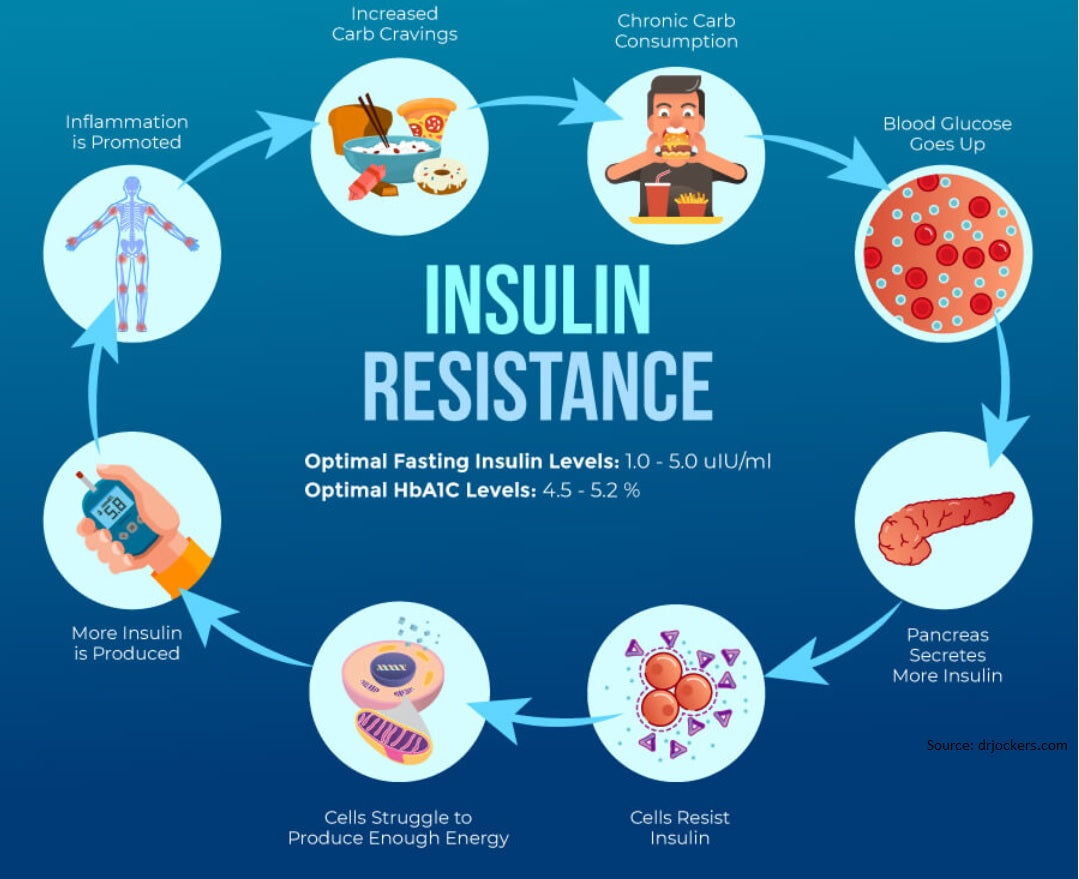
Insulin Resistance and Diabetes: Are they related?
Insulin Resistance leads to Increase in Blood Sugar which may further lead to Development of Type 2 Diabetes in our body.
I always wondered how my spouse had various issues which slowly got developed within the body due to some internal as well as some external factors which now can be seen as the probable cause of development of Type 2 diabetes over a period of almost 15 years. This all started with the birth of the first child, which was heavier than usual children at the time of birth itself leading to a lot of complications and a clear signal to be mindful of how it can turn a lifelong issue if not understood and managed properly.
Our family doctor had warned us about the Invisible changes in the body that can begin long before a person is diagnosed with type 2 diabetes.
That’s both bad news and good news for everyone. Usually, no symptoms or invisible changes mean you won’t know you have it or you can develop it in the near future. But if you know it in advance then you can prevent it or delay it if you’re at risk.
This one of the most important unseen changes is nothing but something called Insulin resistance.
Let’s try to understand it.
Insulin is a key component in our body which can lead to the development of type 2 diabetes if its management goes wrong inside our body. This insulin is responsible for regulating blood sugar (glucose) in the body through a very complicated process. Let me explain this through the below steps.
- Whatever food we eat gets broken down into sugar or Glucose.
- This sugar enters our bloodstream, which signals our pancreas to release insulin.
- Insulin now acts like a key to let blood sugar into our body cells for use as energy.
- Insulin also signals the liver to store excess blood sugar for later use.
- Once sugar gets consumed in the cells, pancreas stops production of insulin.
But have you ever thought what will happen if this balance gets disturbed more frequently due to various reasons like our sedentary lifestyle, bad food/drink/smoking habits, excessive body weight etc. This will lead to a chain reaction like
- A lot of blood sugar enters the bloodstream more often through our food.
- Then the pancreas releases more insulin to allow more blood sugar into body cells.
- Excessive exposure over time will lead body cells to stop responding to insulin—thus becoming insulin resistant. This has gone beyond their capacity to respond to Insulin.
- However, the pancreas as a disciplined organ, keeps making more insulin to try to make cells respond. When you have this condition, your pancreas produces even more insulin to lower your blood sugar levels. This leads to high insulin levels in your blood, known as hyperinsulinemia.
Eventually, your pancreas may become damaged, and this can lead to decreased insulin production.
Now, the stage is set for our promotion to level of prediabetes and/or type 2 diabetes.
Let’s dive deeper to understand the possible causes of Insulin resistance.
- Increased levels of free fatty acids in our blood due to high consumption of too many calories. In fact, overeating, weight gain, and obesity are all strongly associated with insulin resistance.
- Visceral fat that can accumulate around our organs, some of them visible and some invisible inside our body, may release many free fatty acids into our bloodstream.
- Physical inactivity/sedentary lifestyle can also lead to insulin resistance.
How to know if you have Insulin resistance?
- A fairly accurate test called HOMA-IR can estimate insulin resistance based on your blood sugar and insulin levels.
- An oral glucose tolerance test — but this takes several hours.
What are other risk factors which may indicate a possibility of Insulin resistance in the near future?
- overweight or obese, especially if you have large amounts of belly fat.
- Darkened skin in your armpit or back and sides of your neck
- Low HDL (good) cholesterol levels and high blood triglycerides are two other markers strongly associated with insulin resistance.
- Fatty liver (extra fat in the liver)
- Polycystic ovary syndrome (PCOS), when girls have heavy or irregular periods, or even no periods
- High blood pressure (hypertension)
- Obstructive sleep apnea
How Is Insulin Resistance Treated?
Families can work with their health care provider, a dietitian, or a weight management program to build healthy habits. These might include:
- limiting junk food and sugary beverages
- Eating more raw fruits and green leafy vegetables
- Choosing whole grains. Millets are found to be good option.
- Reducing screen time especially 2 hours before and after bedtime.
- Getting more yoga/exercise. Half an hour Walking is a must.
- No smoking/alcohol.
Some of the ayurveda medicines have been found to be useful in reducing excessive fats and improving metabolism of the body.
Daily Detox: https://liwohealth.in/collections/digestive-care/products/daily-detox-100-gm
Ayurvedic Herbal Tea: https://liwohealth.in/collections/diabetes-care/products/chini-mukti-tea-for-diabetes-pack-of-2-units-lasts-for-a-month
